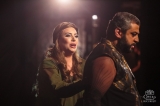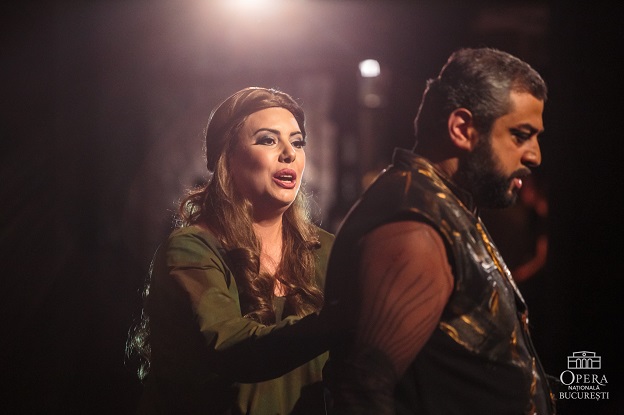Programmed towards the end of the 100th season of the Bucharest National Opera, Verdi’s Otello was one of the most anticipated artistic moments for music lovers of Romania’s capital. Luminita Arvunescu (Radio Romania Muzical) was among the listeners and delivers an enthusiastic review.
The expectations were so high because the conductor was going to be Christian Badea, an American conductor of Romanian descent with a career of over four decades and hundreds of performances conducted at the Metropolitan New York, the Royal Opera House London, Wiener Staatsoper, Sydney Opera, and many more, but had not yet conducted any opera in Romania.
And then because the casting of the leading roles included guests with a well-established international reputation: the Armenian tenor Arsen Soghomonyan (Otello), also the Armenian soprano Hrachuchi Bassenz (Desdemona), and the Belarus’ baritone Vladislav Sulimsky (Jago).
We also have to emphasize that the season 2021-2022 at the Bucharest National Opera was the hundredth season, so an anniversary season with singers like Bryn Terfel in Puccini’s Tosca or Charles Castronovo in Verdi’s Don Carlo. The season also included Wagner’s Lohengrin, the first opera performed at the Bucharest National Opera one hundred years ago – in a new production signed by Silviu Purcarete, with the tenor Benjamin Bruns and the soprano Petra Lang and Riccardo Chailly at the helm of the Bucharest National Opera Orchestra and Chorus.
Welcomed with enthusiastic applauses, Christian Badea set, from the very beginning, the premises for an exceptional musical event. From the tempo full of vitality when displaying the storm and the rigor with which he constructed the Fuoco di gioia choir in the first act, to the whispering wind instruments at the beginning of the final act and the explosion of Otello – Demonico, taci! – Badea’s conducting was masterful. From a purely musical point of view, he was able to ‘fill’ the stage with glorious sound and cover this way any fantasy gap of the stage director Giancarlo del Monaco.
Which was the main quality of his conducting version? Adequacy! Adequacy – regarding the balance between the orchestra pit and the stage, regarding the tempos, adequacy also regarding his body language: precise gestures, firm, without exaggeration.
Arsen Soghomonyan came to Bucharest immediately after a series of Otello performances at the Bayerische Staatsoper München. As Otello he is not yet comparable with Gregory Kunde, nor with Kaufmann and, even less with Domingo, but his singing was very promising. He has both a dramatic and robust voice as well as an appropriate vocal morbidezza. He will have only to work more on Verdian declamation, especially the vocal lines from the third act (the scene in which Otello rejects Desdemona). However, the Dio mi potevi scagliar monologue, was a success for the young Armenian tenor: colorful and with impeccable phrasing.
Regarding the soprano Hrachuchi Bassenz, I confess, that initially I thought that she doesn’t have the vocal consistency for the role of Desdemona. However, in the third act, the strength of her voice made me completely change my opinion. Bassenz is a lirico-spinto voice that has all the attributes needed for this role and most notably an enviable knowledge of singing pianissimo: the way she interpreted Ave Maria in the last act, was a belcanto masterclass.
Vladislav Sulimsky (Jago) impressed me from his first notes. He has a very beautiful Verdian baritone voice, full of overtones, and at the same time, an unusual theatrical nonchalance. Stupendous were Sulimsky’s interventions at the start of Otello’s monologue: those small descending chromatic figurations pointing out the idea that all of Otello’s suffering in the Monologue is in fact Jago’s making! Those are in general just automatically sang by almost all of the baritones.
The rest of the cast consisted of Bucharest Opera singers: among them, the tenor Liviu Indricau, a luxurious Cassio and the bass Filip Panait, a beautiful voice, interpreting Lodovico

























